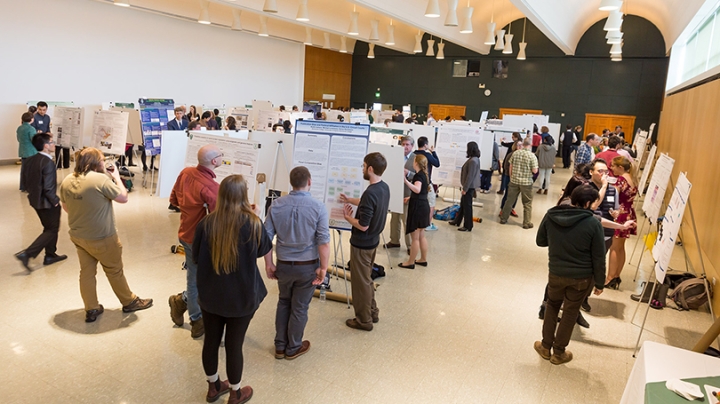Every spring, the Guarini School of Graduate and Advanced Studies hosts events for Graduate Student Appreciation Week, recognizing the contributions all graduate students make to the Dartmouth community. The annual highlight is the Graduate Poster Session, which celebrates graduate student research.
This year, about 200 members of the Dartmouth community gathered in Alumni Hall at the Hopkins Center for the Arts, where 54 graduate students shared their research in subjects ranging from cancer treatments to Greenland ice sheets to political influences on U.S. circuit courts.
A panel of 11 judges selected this year’s top five presenters, awarding them prizes for clear and engaging presentations of their research.
The winning graduate students:
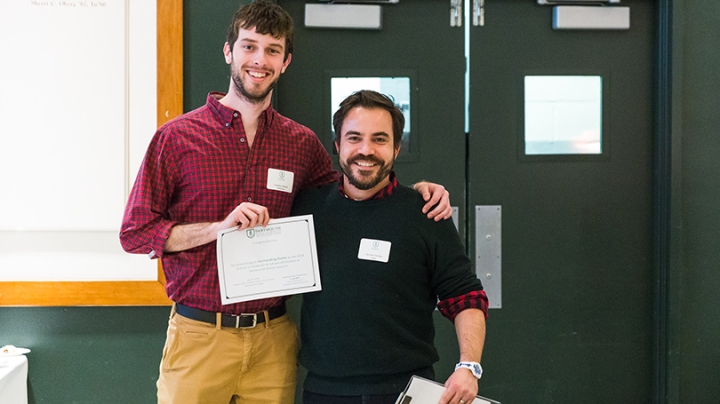
Nicholas Blelloch, PhD Candidate, Chemistry, Guarini
Hometown: Easton, Mass.
Poster Title: Photo-Responsive Sublimable Adhesives
Research: Blelloch is designing novel sublimable adhesives—compounds that bond to surfaces and release easily without force or solvents. His goal is to understand how molecular-level details like a surface’s chemical structure affect how well the adhesives stick and release.
Why Dartmouth? “Growing up in New England and attending college in Vermont, I was drawn to Dartmouth because of its close-knit community and its beautiful location in Hanover. Furthermore, I had the opportunity to work with Assistant Professor Katherine Mirica as an undergraduate and knew how exciting the research was and how friendly everyone at Dartmouth is. Here I have found incredible interdisciplinary resources, both within the new graduate school and at Thayer with Professor Douglas Van Citters, as well as excellent mentorship and friends.”
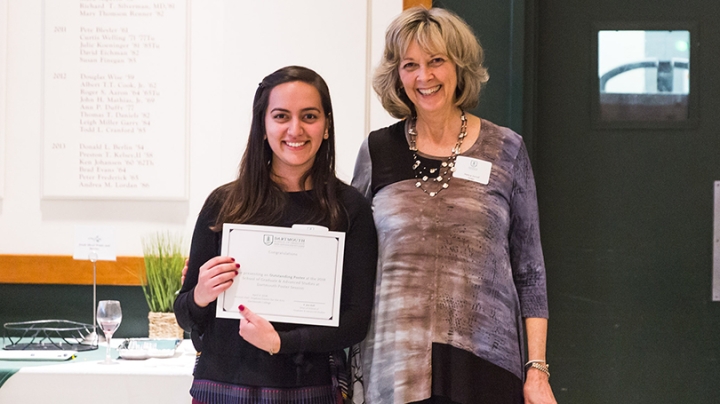
Sally Demirdjian, PhD Candidate, Microbiology and Immunology, Guarini
Hometown: Tripoli, Lebanon
Poster Title: PIP3 Induces Phagocytosis of Non-Motile Pseudomonas aeruginosa
Research: Demirdjian studies immune responses to the bacterial pathogen Pseudomonas aeruginosa, a major cause of hospital-acquired infections in patients with compromised immune systems. This research identifies a potential new therapy to help patients with chronic infections clear the bacteria when other treatments fail.
Why Dartmouth? “When I interviewed for the microbiology program at Dartmouth, I gathered from my interactions with the students that they were very happy with the mentorship they were receiving from the faculty and life in the Dartmouth community. These were very important factors in my decision to join Dartmouth, besides the excellent research itself. As I reflect on my last four years here, I can say with certainty that I feel extremely supported on both academic and social levels.”
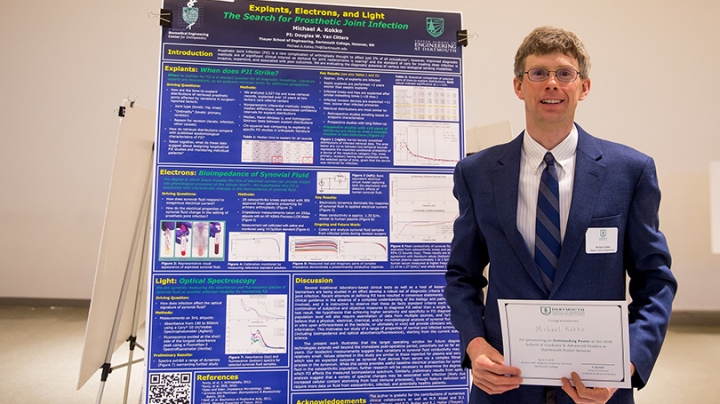
Michael Kokko, PhD Candidate, Engineering, Thayer School of Engineering
Residence: Lyme, N.H.
Poster Title: Explants, Electrons, and Light: The Search for Prosthetic Joint Infection
Research: Kokko’s interest lies in the process of making the best estimates, predictions, and decisions based on indirect, low-fidelity, or incomplete data. His poster summarizes his ongoing work to detect infection in prosthetic hips and knees using data from joint replacements that have been retrieved from patients.
Why Dartmouth? “I moved to the Upper Valley in 2011 and worked for several years as a systems engineer and project manager at Simbex, a Lebanon-based product development firm with strong Dartmouth ties. Teaching has always been a passion of mine, so I enrolled in Thayer’s doctoral program as a step toward refocusing my career on engineering education and research. I feel fortunate to be simultaneously pursuing a PhD and raising a family in a nurturing community amid such beautiful surroundings.”
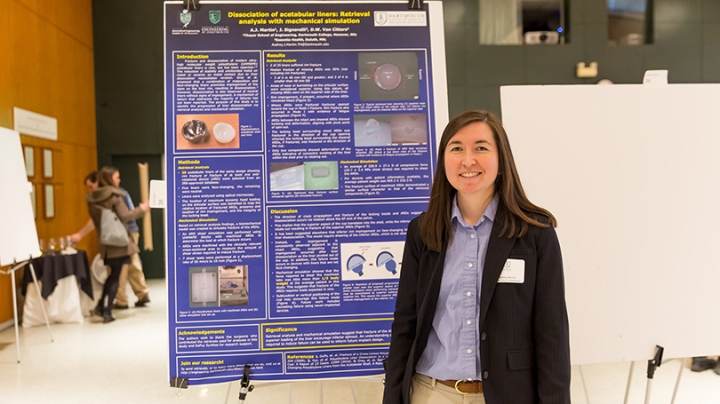
Audrey Martin, PhD Candidate, Engineering, Thayer
Hometown: Torrance, Calif.
Poster Title: Disassociation of Acetabular Liners: Retrieval Analysis with Mechanical Simulation
Research: Martin analyzes the degradation process of materials in failed joint replacement implants. A better understanding of the corrosive processes will lead to improved design and device testing in the future.
Why Dartmouth? “I was drawn to Dartmouth by the Dartmouth Biomedical Engineering Center for Orthopedics (DBEC), the laboratory in which I currently work. I became interested in medical devices and orthopedics as an undergraduate. I knew about DBEC and respected their work, so I sought out the laboratory in my graduate school search as an opportunity to pivot from my undergraduate work. Dartmouth and DBEC have not only provided this opportunity but have also surrounded me with an amazing group of colleagues and friends and provided unlimited access to the outdoors. I have been astounded by the collaborative nature within the laboratory as well as the greater Dartmouth community, making the Upper Valley not only fertile ground for academic growth, but also a place to truly thrive.”
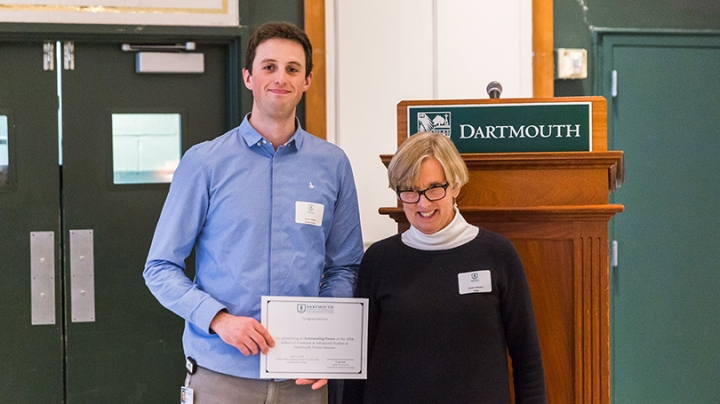
Owen Wilkins, PhD Candidate, Program in Experimental & Molecular Medicine, Guarini
Hometown: London, England
Poster Title: Normal breast tissue 5-hydroxymethylcytosine is enriched at DNA regulatory elements of breast cancer cells
Research: Wilkins studies epigenetics—genetic changes in cells that are not coded in the cell’s DNA. He has identified an epigenetic feature in breast tissue cells that regulates the formation of breast cancer cells, which can help doctors determine whether a patient is at risk of developing breast cancer.
Why Dartmouth? “While completing a study abroad research internship at Dartmouth during the junior year of my undergraduate degree, I was offered a glimpse into the life of a graduate student at Dartmouth. Ultimately interested in pursuing a doctoral degree studying cancer biology, I was attracted by the plethora of expertise and research activities among the faculty in the Program in Experimental & Molecular Medicine. Beyond the academics, Dartmouth’s appeal was enhanced by its proximity to a never-ending list of exciting outdoor opportunities.”
Rebekah Henson can be reached at rebekah.henson@dartmouth.edu.
